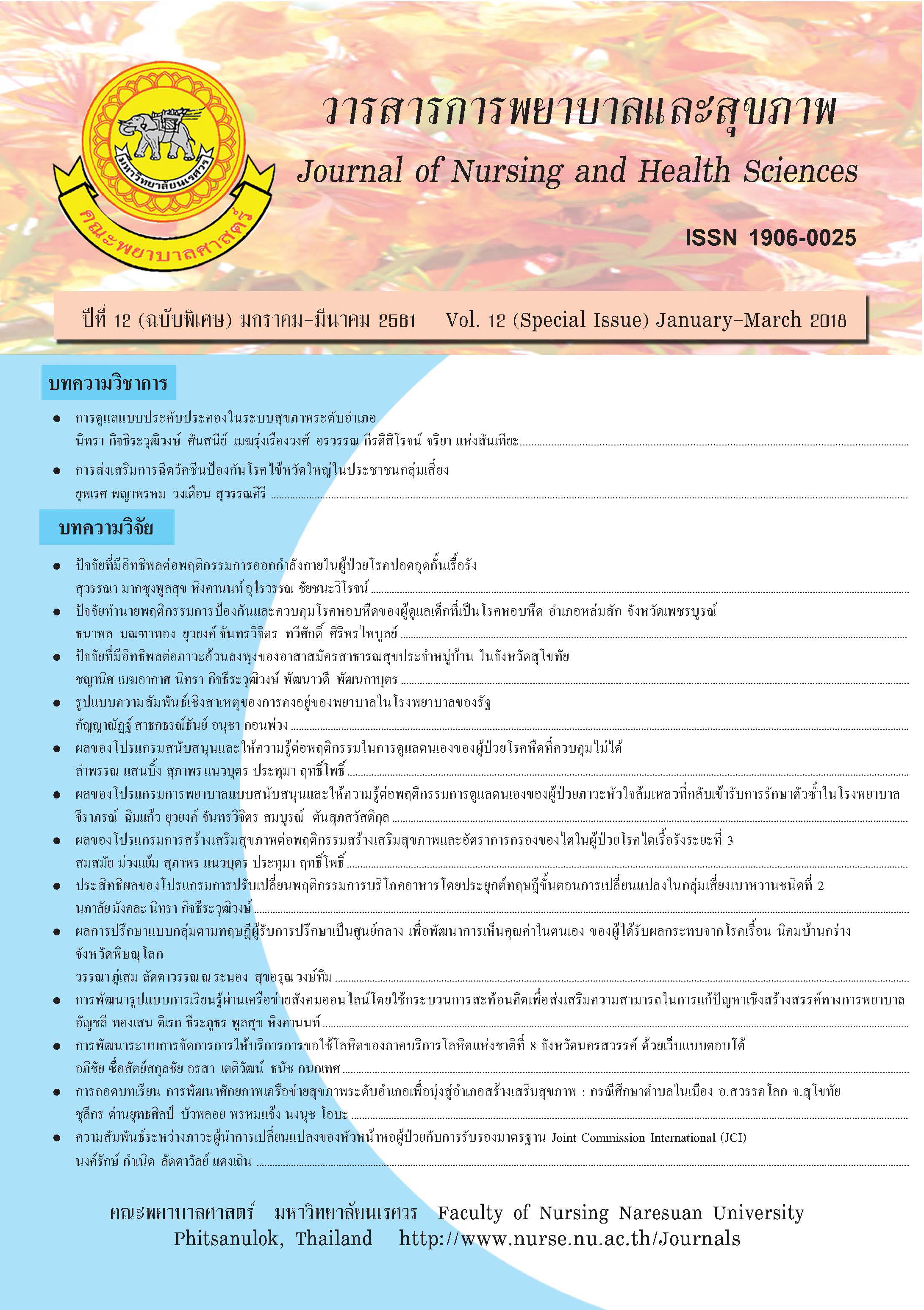Effectiveness of the Dietary Behavior Change Program after Applying the Transtheotertical Model Among Risk Group of Diabetes Mellitus type 2
Main Article Content
Abstract
This quasi experimental research aimed to examine the effectiveness of dietary consumption modification behavior program after applying Transtheoretical Model towards dietary decision, self efficacy in dietary consumption, and dietary consumption behavior among risk group of Diabetes Mellitus type 2 (T2DM). The samples of 60 cases whom screened with the guideline of Department of Disease Control, Ministry of Public Health, Thailand, were divided into two groups, experimental (n = 30) and control group (n = 30). The experimental group participated in the program for 6 weeks while the control group received routine caring. The program consisted of dietary for risk group manual, video, modification of dietary consumption behavior record form. Data were collected through 5 questionnaires: 1) demographic data questionnaire, 2) decisional balance questionnaire, 3) self efficacy questionnaire, 4) dietary consumption behavior questionnaire, and 5) stage of change readiness assessment. Content validity was tested, obtained content validity index (CVI) was 1.00 and the Cronbach’s alpha coefficient of the questionnaires part 2-4 were 0.73, 0.79, and 0.74 respectively. Data were analyzed through descriptive statistics and inferential statistics which were paired t test and independent t test. The results showed that the experimental group had a non difference in the mean score of decisional balance, self efficacy, and dietary consumption behavior when compare with the control group (p = 0.137, 0.564, and 0.238 respectively). Apart from this, after the intervention, the experiment group had a significance higher in the mean score of decisional balance (p = 0.009) while the mean score of self efficacy and dietary consumption behavior had a non difference when compare with prior intervention (p = 0.520, 0.851).
Article Details
References
ประยุกต์ใช้โมเดลการปรับเปลี่ยนพฤติกรรม
(Transtheoretical Model) เพื่อส่งเสริมพฤติกรรม
การออกกำลังกาย. วารสารวิทยาลัยพยาบาล
บรมราชชนนี นครราชสีมา, 19(1), 66-76.
ณิชาพัฒน์ เรืองศิริวัฒก์, ปาหนัน พิชยภิญโญ, และ
สุนีย์ ละกำปั่น. (2556). ประสิทธิผลของโปรแกรม
การปรับเปลี่ยนพฤติกรรมการรับประทานอาหาร
โดยประยุกต์ทฤษฎีขั้นตอนการเปลี่ยนแปลง
ในประชากรกลุ่มเสี่ยงเบาหวานชนิดที่ 2.
วารสารพยาบาลสาธารณสุข, 27(1), 75-87.
โรงพยาบาลส่งเสริมสุขภาพตำบลโรงช้าง. (2558).
รายงานประจำปี 2557. พิจิตร: โรงพยาบาล
ส่งเสริมสุขภาพตำบลโรงช้าง
สมาคมโรคเบาหวานแห่งประเทศไทย. (2557). แนวทาง
เวชปฏิบัติสำหรับโรคเบาหวาน 2557. กรุงเทพฯ:
บริษัท ศรีเมืองการพิมพ์ จำกัด.
สำนักงานสาธารณสุขจังหวัดพิจิตร. (2559). รายงาน
ประจำปี 2558. พิจิตร: สำนักงานสาธารณสุข
จังหวัดพิจิตร.
สำนักโรคไม่ติดต่อ กรมควบคุมโรค กระทรวงสาธารณสุข
สำนักงานปลัดกระทรวงสาธารณสุข. (2559).
รายงานประจำปี 2558. นนทบุรี: สำนักงาน
กิจการโรงพิมพ์องค์การสงเคราะห์ทหารผ่านศึก
ในพระบรมราชูปถัมภ์.
Cohen, J. (1988). Statistical power analysisfor the
behavioral sciences Hillsdale, NJ: Erlbaum.
International Diabetes Federation. (2015). International
Diabetes Federation Diabetes Atlas. (Seventh
edition), retrieved 20 December 2016 from
www.diabetesatlas.org
Jiamjarasrangsi, W., Lohsoonthorn, V., Lertmaharit, S.,
& Sangwatanaroj, S. (2008). Incidence and
predictors of abnormal fasting plasma glucose
among the university hospital employees in
Thailand. Diabetes Research and Clinical
Practice, 79(2), 343-349.
Leonhardt C, et al. (2007). TTM-based motivational
counseling does not increase physical activity
of low back pain patients in a primary care
setting-A cluster-randomized controlled trial.
Patient Education Counseling, doi:10.1016/
j.pec.2007.09.018
Partapsingh, V. A., Maharaj, R. G., & Rawlins, J. M.
(2011). Applying the Stages of Change model
to Type 2 diabetes care in Trinidad: A
randomised trial. Journal of Negative Results
in BioMedicine, 10(13), 1-8.
Prochaska, J. O., & DiClemente, C. C. (1983). Stages
and processes of self-change of smoking:
Toward an integrative model of change. Journal
of Consulting and Clinical Psychology, 51(3),
390-395.
Salmela, S., Poskiparta, M., Kasila, K., Vaจhaจsarja,
K., & Vanhala, M. (2009). Transtheoretical
model-based dietary interventions in primary
care: a review of the evidence in diabetes. Health
Education Research, 24(2), 237-252.
Spencer, L., Wharton, C., Moyle, S., & Adams, T.
(2007). The transtheoretical model as applied
to dietary behaviour and outcomes. Nutrition
Research Reviews, 20, 46-73.
Spring, B., Moller, A. C., & Coons, M. J. (2012). Multiple
health behaviours: overview and implications.
Journal of Public Health, 34(Suppl 1), i3–i10.
http://doi.org/10.1093/pubmed/fdr111
Spritzler, F. (2012). A Low-Carbohydrate, Whole-
Foods Approach to Managing Diabetes and
Prediabetes. Diabetes Spectrum, 25(4), 238-243.
Stolar, M. (2010). Glycemic control and complications
in type 2 diabetes mellitus. American Journal
of Medicine, 23(3 Supplement), S3-11.
Tsenga, H., Liaoc, S., Wena, Y. & Chuanga, Y. (2017).
Stages of change concept of the transtheoretical
model for healthy eating links health literacy
and diabetes knowledge to glycemic control in
people with type 2 diabetes. Primary care
Diabetes, 11, 29-36.


